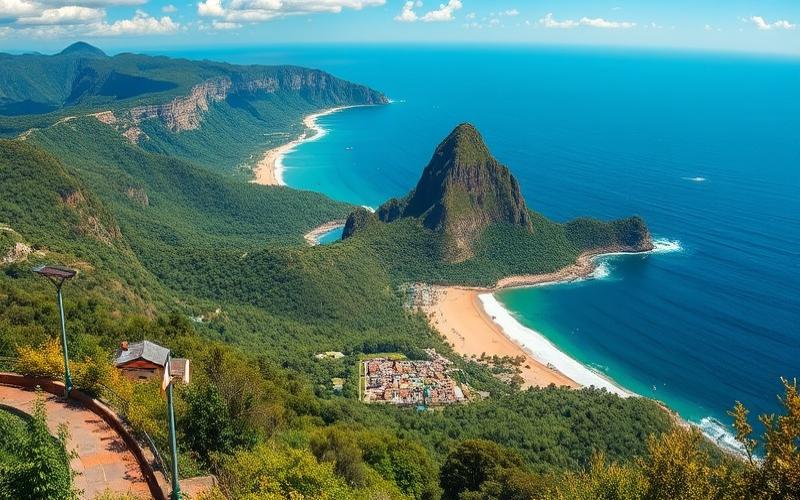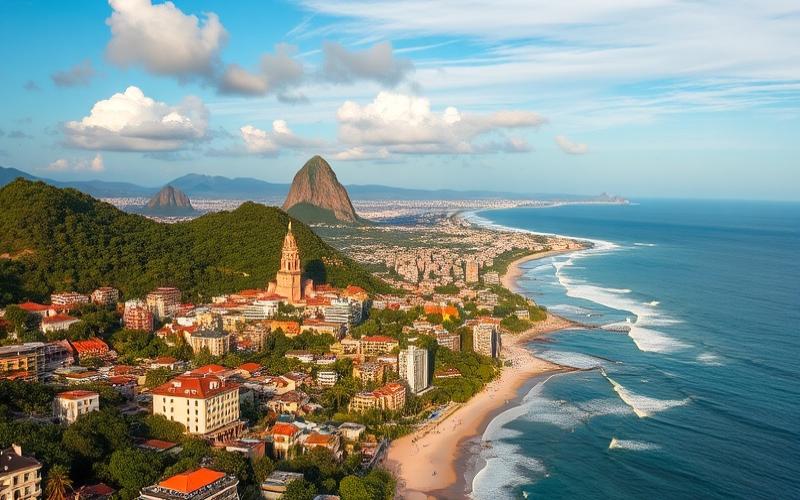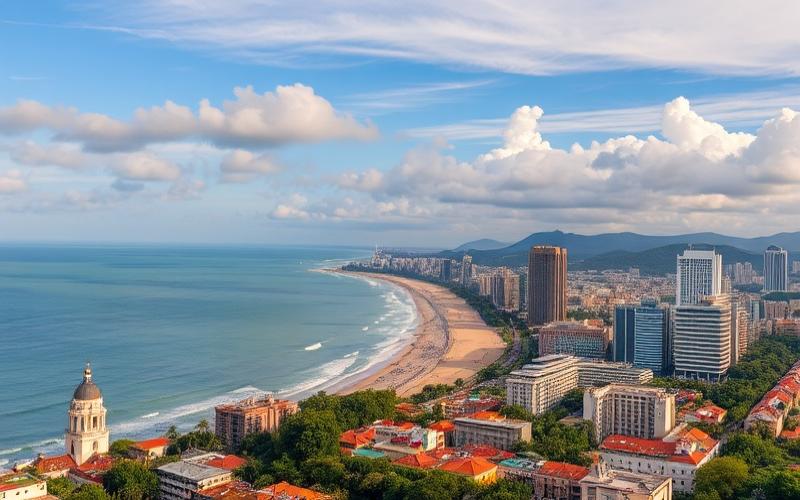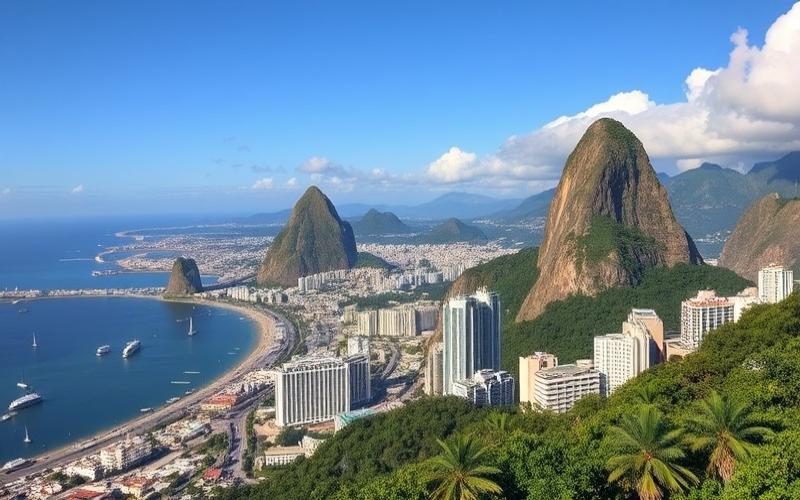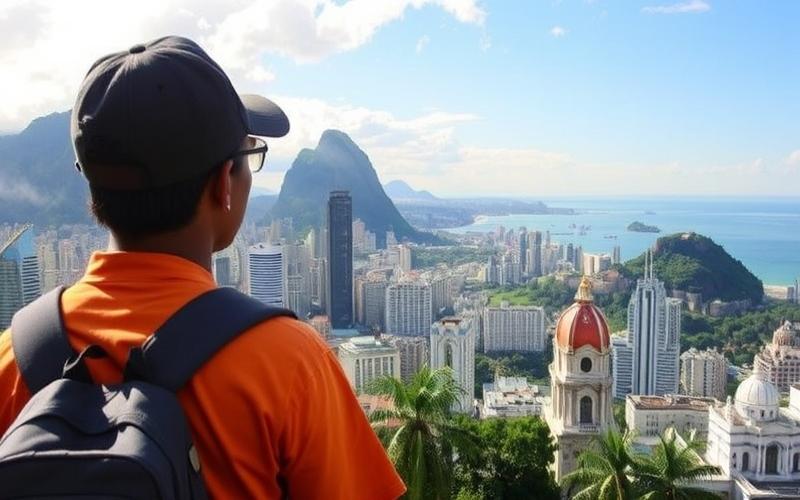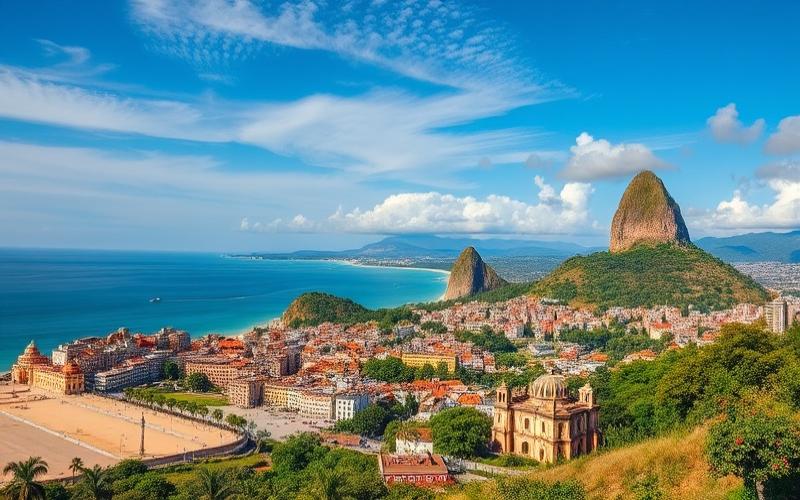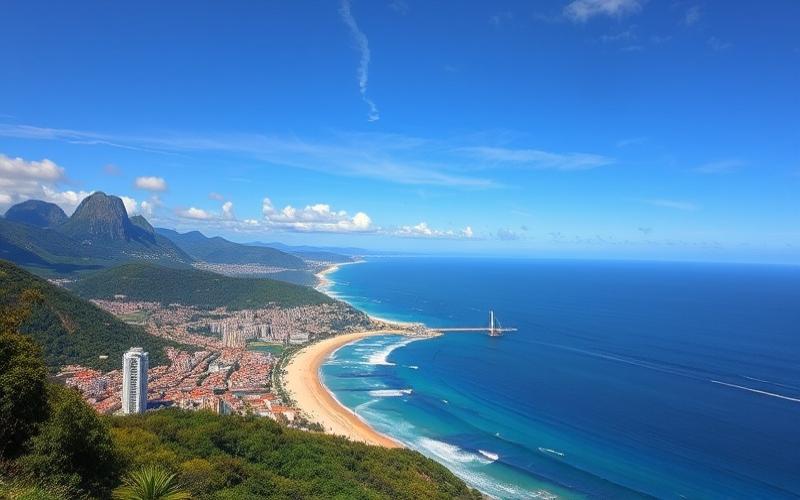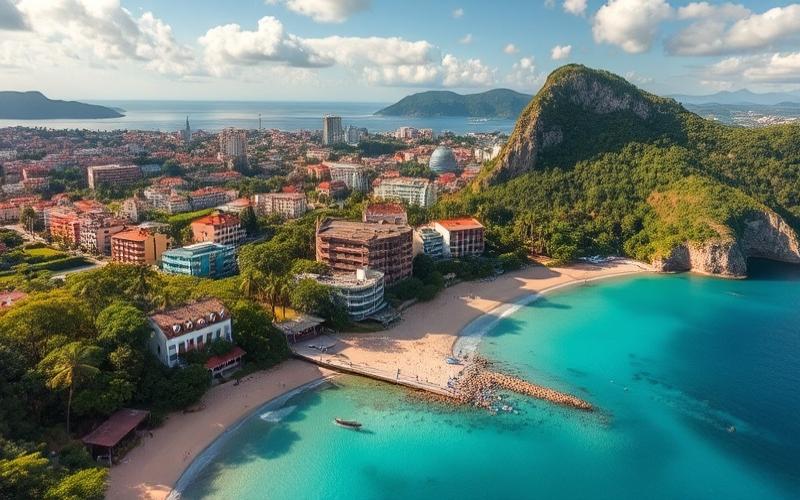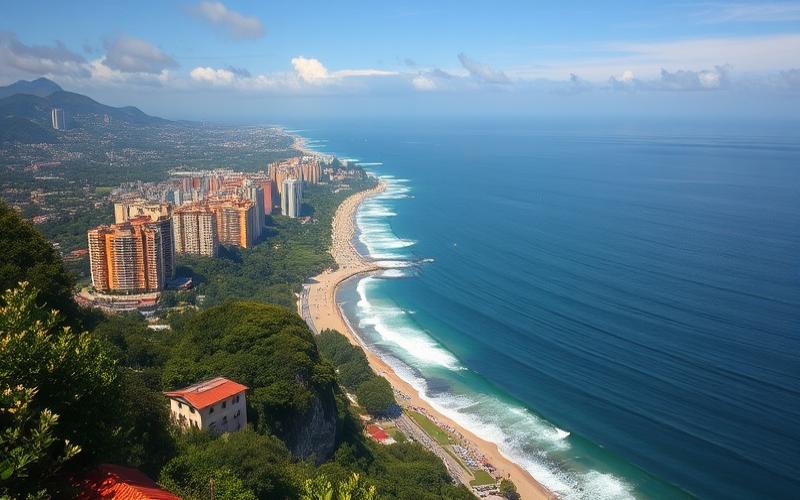
 Published on and written by Cyril Jarnias
Published on and written by Cyril Jarnias
Brazil, a vibrant country rich in cultural diversity, is a top destination for students worldwide, offering a unique academic experience. Aspects of student life there are largely influenced by the dynamism of its metropolises and the warm welcome of its population.
However, navigating through scholarship and housing options can prove complex for those coming to study in this vast country.
In search of financial support, students will find numerous opportunities through government and private programs. Additionally, housing solutions vary, ranging from modern university residences to more intimate shared accommodations, thus offering flexibility that adapts to everyone’s needs and budgets.
Studying in Brazil: Guide for International Students
Steps to Obtain a Student Visa for Brazil:
- Be accepted by a recognized Brazilian university.
- Fill out the electronic student visa application form (VITEM IV) via the Brazilian consulate’s website, preferably using a PC with Firefox or Chrome.
- Scan and upload all required documents in the form:
- Valid passport (at least 6 months after planned return date, with 2 blank pages)
- Recent ID photo
- Complete birth certificate
- Recent criminal record extract
Total estimated budget: from €350 (public university/modest shared housing) to over €1000 per month, depending on lifestyle/housing/city.
Tips for Finding Student Housing & Popular Types:
Popular Types:
- University residences (“repúblicas”): economical, guaranteed immersion but limited availability outside major cities/prestigious public universities
- Shared apartments (“apartamentos compartilhados”): very common among local and international students; listings on social networks/Facebook groups/university/specialized sites (example: OLX.br)
- Studios/individual apartments: more expensive but complete independence
Practical Tips:
- Prioritize neighborhoods close to campus/universities well-served by public transportation
- Visit in person before any final commitment if possible; be wary of financial advances without a clear written contract
- Seek advice from local student associations that can connect you with reliable roommates
Tips for Adapting to Brazilian Culture & Daily Life:
- Learn some basic Portuguese before your departure – it’s essential even in major cities
- Punctuality is relative; cultural flexibility is important
- Direct/warm human relationships – don’t be surprised by physical proximity during friendly exchanges
- Safety: always prioritize basic urban caution especially in certain metropolitan areas
- Quickly try local cuisine – typical dishes like feijoada, pão de queijo…
- Actively participate in university/sports/festive events that strongly shape social life
Useful Resources:
https://www.gov.br/mre/pt-br/consulado-paris/servicos-consulares/visas/
https://www.studyinbrazil.com.br/
For local housing search: OLX Brasil (https://olx.com.br), Facebook groups “estudantes internacionais +”, official university forums
Good to Know:
To obtain a student visa for Brazil, it’s essential to enroll in a recognized institution and prepare the required documents, such as the budget certificate and proof of financial resources; students can search for scholarships through platforms like “Brazilian Government Scholarships” and consider shared housing or university residences to reduce accommodation costs, with useful resources available on university websites to adapt to local culture.
Understanding Student Scholarship Options in Brazil
Types of Scholarships Available for Students in Brazil
| Scholarship Type | Origin | Level Concerned | Main Benefits |
|---|---|---|---|
| Government Scholarships | Brazilian Government (e.g., PEC-G, GCUB-Mob) | Undergraduate, Master’s, PhD | Tuition exemption, monthly stipend |
| University Scholarships | Brazilian Universities | Undergraduate, Master’s, PhD | Full/partial exemption, housing assistance |
| Private Scholarships | Foundations, Companies, NGOs | Variable | Financial support, living expenses |
| International Scholarships | Organizations (UNESCO, etc.) | Mainly postgraduate | Financial support, travel expenses |
Examples of Major Scholarships
- PEC-G (Undergraduate Student Agreement Program):
- Government scholarship for international students wishing to study undergraduate in Brazil.
- Offers exemption from admission fees and academic costs but does not cover housing or food.
- Application via Brazilian embassy or consulate in home country.
- GCUB-Mob:
- International mobility program for master’s and PhD.
- Offers monthly stipend and tuition fee exemption.
- Requires intermediate Portuguese level by end of program.
- University Scholarships:
- Some Brazilian universities offer their own programs, partially or fully covering tuition fees, sometimes with housing assistance.
- Private and International Scholarships:
- Offered by foundations, companies and international organizations, they often target specific fields or underrepresented profiles.
Typical Eligibility Criteria
- Academic: Good academic record, sometimes language tests (Portuguese, English).
- Financial: Proof of limited resources for certain scholarships.
- Nationality: Some scholarships reserved for students from certain countries or regions.
- Study Project: Coherence of project with chosen program, motivation letter.
- Other: Sometimes commitment to return to home country after studies.
Application Process
- Search for Suitable Scholarship: Identification of program matching profile and project.
- Document Preparation:
- Translated diplomas and transcripts
- Motivation letter and CV
- Proof of financial resources (depending on scholarship)
- Valid passport
- Portuguese proficiency certificate (often required)
- Application Submission: Online or via embassy/consulate for government scholarships.
- Possible Interview or Tests: Some scholarships require additional assessment.
- Results and Visa Procedures: If accepted, obtain student visa and organize departure.
Frequently Required Documents
- Application form
- Certified copies of diplomas and transcripts
- Motivation letter
- Detailed CV
- Proof of financial resources
- Valid passport
- ID photos
- Recommendation letter(s)
Impact on Student Cost of Living in Brazil
Scholarships covering only academic fees don’t always include housing, transportation and food expenses.
As a reference, monthly living cost (excluding tuition) in São Paulo or Rio de Janeiro:
| Expense Item | Average Monthly Cost (in euros) |
|---|---|
| Shared housing | 185 |
| Utilities | 23 |
| Internet | 19 |
| Local transportation | 41 |
| Fast food | 7 (per meal) |
Obtaining a scholarship significantly reduces total cost, especially if it includes a monthly stipend. However, students often need to plan a personal budget to supplement.
Testimonials from Scholarship Recipients
“Thanks to the PEC-G scholarship, I was able to study for free at a renowned university in Brasilia. However, I had to work part-time to cover my housing and meals. The experience was enriching but demanding, especially the first year, while adapting to the language and culture.”
“The GCUB-Mob scholarship allowed me to fund my master’s studies and live decently in Curitiba. The stipend received was enough for rent, but I had to manage my budget carefully for other expenses. The university support was excellent, and I was able to participate in international research projects.”
Benefits and Challenges Encountered
- Benefits:
- Access to quality higher education
- International network and multicultural experiences
- Personal and professional development
- Challenges:
- Linguistic and cultural adaptation
- Budget management for uncovered expenses
- Family distance and complex administrative procedures
Scholarships in Brazil open real opportunities but require preparation, autonomy and adaptability.
Good to Know:
Some Brazilian scholarships cover not only tuition fees but also housing and living expenses, which can significantly reduce the total cost of student life. To maximize your chances, start the process early and ensure you have all required documents, such as transcripts and proof of income.
Student Housing in Brazil: Tips and Advice
Types of Housing Available for Students in Brazil:
- University Residences (PBSA): Housing managed by universities or private operators, often located near campuses, with included services (security, internet, study spaces, common rooms, sometimes gym).
- Shared Apartments: Apartments shared among several students, allowing cost division and promoting social life. Often more flexible regarding deposits and contracts.
- Independent Studios: Small apartments, usually unfurnished, offering more privacy but at higher cost.
- Gated Communities: Secure residences with doorman, green spaces and leisure services, preferred by families and some students seeking security.
- Student Repúblicas: Collective system with strong tradition in secondary university towns, offering reduced cost but less privacy.
Average Costs by Housing Type and City
| Housing Type | São Paulo (BRL/€) | Rio de Janeiro (BRL/€) | Belo Horizonte (BRL/€) |
|---|---|---|---|
| University Residence | 1,000–2,000 BRL | 1,000–2,000 BRL | 800–1,500 BRL |
| Shared Room | 1,200–2,500 BRL | 1,000–2,000 BRL | 900–1,500 BRL |
| Independent Studio | 2,000–2,800 BRL | 2,000–2,500 BRL | 1,500–2,200 BRL |
| 3-Room Apartment | 3,000–5,000 BRL | 3,500–7,000 BRL | 2,500–4,000 BRL |
1 € ≈ 5.4 BRL (indicative). Prices vary by neighborhood, campus proximity and amenities. Utilities (water, electricity, internet) are often additional.
Practical Tips for Finding Affordable Housing
- Online Search: Use specialized student platforms, university Facebook groups, local sites (Zap Imóveis, OLX, QuintoAndar).
- Contact Agencies and Owners: Prioritize local agencies for more competitive prices. Speak directly with building doormen, often informed about available apartments.
- Visit Properties: Schedule multiple visits, check property condition, neighborhood safety, proximity to transportation and shops.
- Beware of Scams: Never send money before visiting property and signing contract. Prioritize payments via secure platforms or with witnesses present.
Tips for Securing Housing Near Campuses
- Target Student Neighborhoods: Identify traditionally student-occupied neighborhoods (e.g., Vila Mariana in São Paulo, Urca or Botafogo in Rio, Savassi in Belo Horizonte).
- Prioritize Transportation Proximity: Check for bus or subway lines directly connecting to campus.
- Opt for Security: Prefer residences with doorman, video surveillance or controlled access.
- Consult University International Office: Some universities offer verified housing lists or support services for international students.
Local Student Housing Culture in Brazil
- Unfurnished Rental: Majority of housing rented empty, without appliances. Budget for furnishing.
- Rental Contract: Standard 6 to 12 month contracts, sometimes shorter for international students. Some shared housing may not require formal contract.
- Security Deposit (caução): Generally 1 to 3 months’ rent, sometimes replaced by local guarantor (fiador). International students often exempt if renting through university residence.
- Common Practices: Tenant must subscribe to own electricity and internet contracts. Condominium fees sometimes included in rent, sometimes not.
Testimonials from International Students
“Shared housing in São Paulo allowed me to meet other international students and reduce my costs. I recommend visiting several apartments before choosing.”
“In Belo Horizonte, studios are affordable, but you need to be quick: good housing goes fast at the start of the semester.”
“I chose a university residence near campus in Rio, the security was a real plus. Remember to contact the international office, they have reliable housing lists.”
Essential Tips to Remember:
- Prioritize campus and transportation proximity for safety and convenience.
- Compare offers across multiple platforms and seek university assistance.
- Budget for furnishing and additional charges.
- Always visit before committing and read rental contract carefully.
Key Takeaway:
Searching for student housing in Brazil requires anticipation, vigilance and adaptation to local culture. Shared solutions remain the best compromise between cost, security and social life.
Good to Know:
By opting for shared housing in São Paulo, you can reduce your monthly costs to around 1500 BRL, and to secure housing near campuses, it’s advised to start online searches in May or June for the February intake.
Disclaimer: The information provided on this website is for informational purposes only and does not constitute financial, legal, or professional advice. We encourage you to consult qualified experts before making any investment, real estate, or expatriation decisions. Although we strive to maintain up-to-date and accurate information, we do not guarantee the completeness, accuracy, or timeliness of the proposed content. As investment and expatriation involve risks, we disclaim any liability for potential losses or damages arising from the use of this site. Your use of this site confirms your acceptance of these terms and your understanding of the associated risks.

